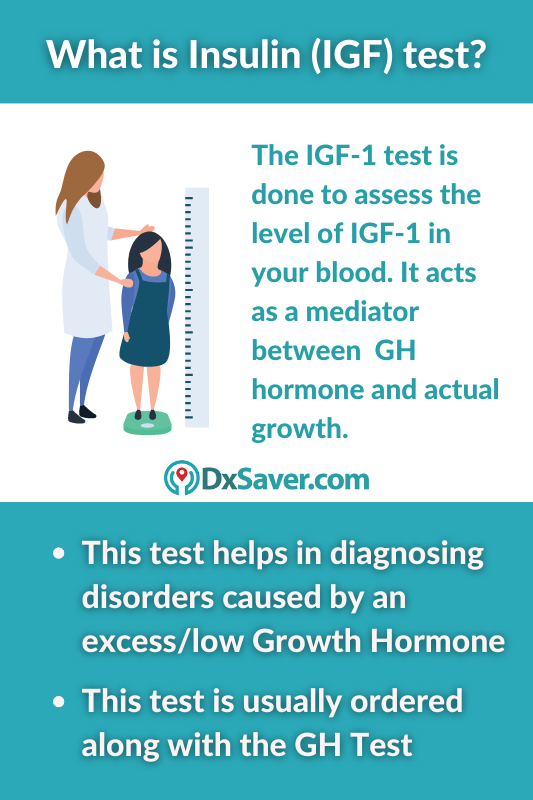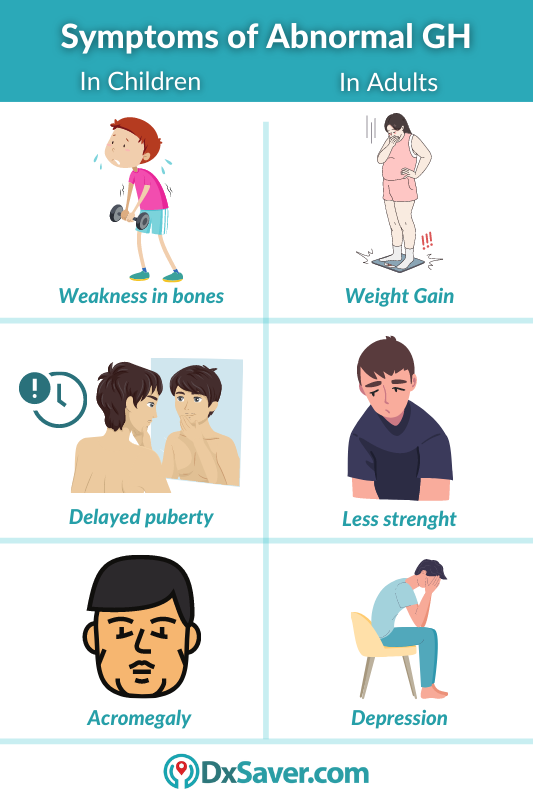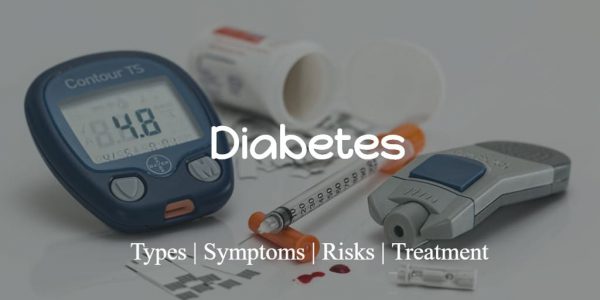
IGF-1 test (Insulin-like growth factor test) is a simple test ordered by your physician to measure the level of insulin-like growth factor 1 (IGF-1) in the blood. This test is done to diagnose various disorders that affect child growth. Because IGF-1 is one of the important hormones responsible for child growth and development.
The article below covers all the important topics that are related to the IGF-1 blood test like the IGF-1 test cost, normal IGF-1 levels, procedure, preparation, risks, and how to get tested for an IGF-1 blood test.
- IGF-1 Test Cost.
- What is IGF-1?
- Why is an IGF-1 test done?
- Normal IGF-1 levels for age
- How is the IGF-1 test done?
- Is there any preparation required before the test?
- Are there any risks in the test?
- What does the IGF-1 test results mean?
- How to treat abnormal IGF-1 levels?
- Providers Locations
For our readers, who are very much interested in knowing the IGF-1 test cost beforehand, we would like to begin with that section.
How much does the IGF-1 test cost?
IGF-1 test cost ranges between $97 and $129 in different labs and facilities across the U.S. No prior appointment is required. Compare the price, order your test online and visit the nearest lab during lab business hours. Complete the procedure and get the results in your email within 2 to 3 business days.
The following table shows the IGF-1 test cost at 2 of our partner laboratories (CLIA – Certified) network located across the U.S.
PersonaLabs
- Reports – 2 to 5 days
- The entire U.S. except for New York, New Jersey & Rhode Island
- Required to visit the lab
Starting from
$97
HealthLabs
- Reports – 1 to 3 days
- The entire U.S.
- Required to visit the lab
Starting from
$258
$129
IGF-1 test cost with insurance
Most of the health insurance policies in the U.S. do not cover the cost of the IGF-1 test unless it is medically necessary. However, the coverage offered by private health insurance companies and national health insurance programs like Medicare and Medicaid varies widely. So we recommend you to check the coverage of your health insurance plan with the insurance company before getting tested for IGF-1 levels.
Our IGF-1 testing providers do not accept any kind of health insurance plan. But, on request, they can provide you with an itemized receipt containing all the details like the name and code of the test, and CPT code that is necessary for insurance reimbursement purposes.
What is IGF-1?
IGF-1 refers to insulin-like growth factor 1 and it is also known as “Somatomedin C”. IGF-1 is a natural hormone produced by the liver, skeletal muscle, and many other tissues in response to growth hormone (GH) stimulation. It helps to control the growth hormone that is secreted in the pituitary gland. The pituitary gland is the tiny pea-sized gland located at the base of the brain and it is the master gland that produces various hormones responsible for various body functions.
IGF works along with the growth hormone to promote growth and bone and tissue development. It can also work with insulin rapidly to reduce the blood sugar levels in the blood.

Why is an IGF-1 test done?
The IGF-1 test is done to rule out the level of IGF-1 in the blood. The IGF levels in the blood help to diagnose various disorders caused by excess or deficiency of GH. This is because IGF regulates the effects of growth hormone in the body and acts as a mediator of GH in child growth and development. This test is also done to evaluate the pituitary gland function.
GH levels vary throughout the day and IGF-1 levels reflect the average production of growth hormone. So the IGF-1 test is mostly ordered along with the GH stimulation test when you experience the following symptoms that are caused by excess or deficiency of GH.
Symptoms in children
- Dwarfism
- Acromegaly (abnormal growth of the face and limbs)
- Fatigue
- Weakness in the bones
- Delayed puberty
Symptoms in adults
- Decreased bone density
- Fatigue
- Depression
- Unexplained weight gain
- Less strength
- Reduced exercise tolerance
However, testing for IGF-1 deficiency in adults is not routine as low IGF-1 levels rarely cause these symptoms.
The IGF-1 test is also ordered at regular intervals to monitor the effectiveness of ongoing treatment for GH production or the functioning of the pituitary gland.

Normal IGF-1 levels for age
The normal IGF-1 levels in the blood vary based on age. The levels of IGF-1 are generally measured in nanograms per milliliter (ng/ml). The normal levels are
- Normal IGF-1 levels for age 16 to 24 – 182 to 780 ng/ml
- Normal IGF-1 levels for age 25 to 39 – 114 to 492 ng/ml
- Normal IGF-1 levels for age 40 to 54 – 90 to 360 ng/ml
- Normal IGF-1 levels for age 55 and above – 71 to 290 ng/ml
How is the IGF-1 test done?
The IGF-1 test is a simple blood test that can be done using a sample of blood. During this test, a lab technician or a phlebotomist will cleanse the area to be injected with an antiseptic liquid and wrap an elastic band around the upper arm to make the vein noticeable and pool with blood. He/she then injects a needle to draw a sample of blood and collects the sample in a test tube. After the blood is drawn, he/she will ask you to apply pressure on the injected area with a band-aid or a cotton ball to stop bleeding. The collected blood sample is then sent to the lab for further testing.
It takes less than 5 to 10 minutes to perform this test.
Is there any preparation required before the test?
For an IGF-1 blood test, there is no special preparation required. But it is very important to inform your physician about the medications and supplements that you take, before the test. Because these medications and supplements can influence the IGF-1 levels and result in an inaccurate diagnosis.
Are there any risks in the test?
There are no possible risks or complications in the IGF-1 blood test. But sometimes after the blood sample is drawn, you might feel dizziness, slight pain, bruise, or redness in the injected area for a very little period. If you have any abnormal bleeding in the injected area, inform your physician or phlebotomist immediately.
What does the IGF-1 test results mean?
If the IGF-1 levels are higher than normal, it indicates the excess production of GH in the body and the possibility of a tumor in the pituitary gland. However, elevated levels of GH and IGF-1 are normal during puberty and pregnancy.
If the IGF-1 levels are lower than normal, it indicates the deficiency of GH or insensitivity to growth hormone. It might also be possible due to hypopituitarism (decrease in the functioning of the pituitary gland).
Sometimes, the higher and lower levels of IGF-1 are also caused by liver disease, low thyroid hormone levels, or uncontrolled diabetes.
The test result might vary based on age, gender, medical history, the method of testing, and other factors. So it is very important to discuss the results with your concerned physician.
How to treat abnormal IGF-1 levels?
As IGF-1 levels are associated with GH levels, treating the GH levels would bring the IGF-1 levels back to normal. The lower GH levels can be treated with growth hormone therapy (injecting growth hormone into the body) and higher GH levels can be treated with the drugs that block the growth hormone. If there are other reasons behind the abnormal IGF-1 levels, treatment will be given based on the underlying condition.
If appropriate and necessary, your physician might order other tests like thyroid and diabetes tests to rule out and confirm the diagnosis.
Providers Locations
The IGF-1 blood test can be done in any of the following locations across the U.S. by visiting the nearest lab. To know the IGF-1 test cost, refer to the first section of the article.
- Alabama
- Arizona
- Arkansas
- California
- Colorado
- Connecticut
- Delaware
- Florida
- Hawaii
- Georgia
- Idaho
- Illinois
- Indiana
- Iowa
- Kansas
- Kentucky
- Louisiana
- Maine
- Michigan
- Minnesota
- Mississippi
- Missouri
- Montana
- Nebraska
- Nevada
- New Hampshire
- New Mexico
- North Carolina
- North Dakota
- Oklahoma
- Oregon
- Pennsylvania
- Puerto Rico
- South Carolina
- South Dakota
- Tennessee
- Texas
- Utah
- Vermont
- Virginia
- Washington
- West Virginia
- Wisconsin
- Wyoming
Frequently Asked Questions
Will insurance cover my testing cost?
No, insurance will not be covered in the billing. However, they will provide you a receipt for insurance reimbursement purposes.
How should I book my appointment?
You can choose the most suitable provider from above and make an appointment by following the instructions mentioned by them.
Can I cancel my lab test order?
Yes, you can cancel your lab test order anytime before your testing. A refund will be initiated after deducting the cancellation fee. However, cancellation is at the discretion of the provider.
Do the providers offer result interpretations?
Yes, a few providers may provide doctor consultation who will take you through the results and provide clarification if needed.
How do I receive my report?
To ensure your privacy, the test report will be mailed to you by the provider.
Other topics you may be interested in:-
- STD Testing Cost in the U.S.
- Eye Chlamydia Symptoms
- What STDs cause Sore Throat?
- Estrogen Hormone Test Cost in the U.S.
- Cost of HCV, Hepatitis C Test in the U.S.
- Why Is Gonorrhea Called The Clap STD?
- How much does the Stool Culture Test Cost in the U.S?
- Cost of PSA Test for Prostate Cancer in the U.S.
- Renal Panel (Kidney Function Panel) Test Cost in the U.S.
- CEA Test Cost in the U.S
- At home Chlamydia Test Cost in the U.S.
- Cost of Sickle Cell Test in the U.S
- RBC blood test cost in the U.S.
- How much does the C-Peptide Test Cost in the U.S?
- Lipid Profile Testing, Normal Levels & Diagnosis
- Causes of Penile Rashes and Other STD Symptoms in Men
- Oral STDs: Names, Symptoms, Treatment and Testing Cost
- Food Sensitivity Test Cost in the U.S.
- HPV in Women: Symptoms, Genital Warts, Treatment and More
- What is D-Dimer Test? Know more on Normal Levels, Diagnosis & Treatment






